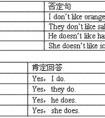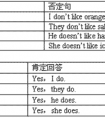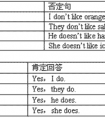用括号内所给动词的适当形式填空。1. He said that he __________ (watch) a basketball match at that time. 2. Caring for wild animals in danger _______ (be) impor-八年级英语
②不能说:He has turned writer since 3 years ago.
应改为:He has been a writer since 3 years ago.
或It is three years since he turned writer.
③不能说:He got angry until his child came back home.
应改为:He didn’t get angry until his child came back home.
5.系动词能接几种表语(从句)
系动词除了接adj.\n.\prep.短语,某些adv.以外,还可接以下几种表语形式:
①能接as if/as though表语从句的系动词有:look(看起来),smell(闻起来),sound(听起来),feel(觉得);appear(显得),seem(似乎)。例如:
It looks as if we are going to have snow.看样子天要下雪了。
He looked as if he had just stepped out of my book of fairy tales.
他看来好像刚从我的童话故事中走出来似的。
She seemed as if (though) she couldn’t understand why Laura was there.
看来她好像不能理解为什么劳拉呆在那儿。
It sounds to me as though there’s a tap running somewhere.
我好像听到某处水龙头流水的声音。
She felt as if her head were splitting.
她仿佛觉得她的头要裂开了。
The river appeared as if enveloped in smog.
那条河好像笼罩在烟雾之中。
It seems as if it were spring already.
好像已是春天了。
②可用于“It+系动词+that从句”结构的有:seem, appear, 不可用be, look。如:
It seemed that he had made some serious mistakes in his work.
好像他在工作中犯了严重错误。
It appeared that he was talking to himself.
好像他在自言自语。
③能用不定式作表语的系动词有:be, seem, get, look, appear, prove, grow.
Her job is to look after the children.
她的工作是照料孩子们。
He seems not to look after the children.
他好像不是她的父亲。
She looks to be a young girl of twenty year-old.
她看起来像是一个20岁的年轻姑娘。
He didn’t appear to dislike it.
看不出他憎恨此事。
My advice proved to be wrong.
我的建议证明是错误的。
He will grow to like this work gradually.
他会逐渐喜欢这个工作的。
④能与there连用的系动词有:be, appear, seem.
There appeared to be only one room.
那儿好像只有一个房间。
There seems(to be)no need to go.
似乎没有必要走。
6.能用两种否定形式的系动词有两个:seem, appear.
举例说明:
It doesn’t seem that we can get our money back.= It seems that we can’t get our money back.
He seems not to be her father.= He doesn’t seem to be her father.
The baby doesn’t appear to be awake.= The baby appears not to be awake.
7.后接作表语的过去分词可构成系表结构
能构成系表结构的系动词通常有两个:第一个是常见的be(is, am, was等);第二个是get,口语中常用。
当二者作系动词用时,它们均表示一种存在状态,而不表示被动动作;当二者作助动词用时,后接作谓语的过去分词构成被动语态。
Be + P.P常可以用get + P.P.来代替,但是并不是be系动词总是可以用get来代替。Get + P.P.系表结构常用于以下两种情况:
1)表示偶然的、突发性的、意想不到的被动动作的结果或状态。
Last night I got caught in the downpour.昨夜我被雨淋了(表示意想不到)
The new car got scratched.新车给刮坏了。(表突发性)
2)表示对自身所作的事。如get dressed, get lost等。
John got injured while playing football last Saturday.约翰上周星期六踢足球时受了伤。
They got married last month.他们上个月结婚了。
另外,要注意区分系表结构与被动语态结构的用法。
考点名称:不定式
- 动词不定式:
指由to加上动词原形(而且只能是动词原形)所构成的一种非限定性动词,但在有些情况下to可以省略。
动词不定式在语法功能上可作主语、宾语、宾语补足语、表语、定语和状语。 - 动词不定式可以作以上各种成分,但它毕竟是动词,所以有动词的属性。
动词不定式及其短语还可以有自己的宾语、状语,虽然动词不定式在语法上没有表面上的直接主语,但它表达的意义是动作,这一动作一定由使动者发出。
这一使动者我们称之为逻辑主语,其形式如下:
时态 主动形式 被动形式 一般式 (not) to do (not) to be done 完成式 (not) to have done (not) to have been done 进行式 (not) to be doing 完成进行式 (not) to have been doing - 不定式的用法:
1、不定式作主语
例如:To remember this is very important.
注意:为了避免头重脚轻,在许多情况下,通常都将作主语的不定式置于句子后部,而在句首主语位置使用形式主语it。
例如:It is very important to remember this.
2、不定式作表语
例如:He seems to be ill.
注意:不定式作表语主要有三种情况,一是用于seem, appear, prove等系动词之后的不 定式(尤其是to be),
二是像My job is to sweep the floor. 这样的主语与表语“等价”的情形,
三是表示想法、约定、义务、命令、可能性、命运等,如:
You are to come when I call.
3、不定式作宾语
例如:I can not afford to buy a car.
注意:
①不定式不仅用作动词的宾语,还可用作个别介词(but, except)的宾语。
例如:I had no choice but to wait.
②当作宾语的不定式后跟有宾语补足语时,通常要用形式宾语it代替不定式,并将真正的宾语不定式置于宾语补足语之后
例如:I find it difficult to learn Japanese well.
4、不定式作宾语补足语
例如:Who taught you to drive?
5、不定式作定语
例如:I have a question to ask you.
注意:有的名词(如way, chance, right等)后用作不定式可换成of doing sth.
如:It is the best way to do (of doing) it.
但是以下名词后接不定式作定语时通常不能换成of doing sth.
attempt courage decision effort fortune failure invitation wish
6、不定式作状语
例如:I went to France to learn French.
考点名称:动名词
- 动名词:
如果一个动词加上了ing变成了名词,那么这个词称动名词。 动名词是一种兼有动词和名词特征的非限定动词。
它可以支配宾语,也能被副词修饰。
由于动名词是由动词变化而来,它仍保留着动词的某些特征,具有动词的某些变化形式,用以表达名词所不能表达的较为复杂的意念。
动名词的名词特征表现在它可在句子中当名词来用,作主语、宾语、表语、定语。 动名词的结构和形式:
动名词的否定结构:
动名词的否定结构由not 动名词组成。如:
Trying without success is better than not trying at all. 实验没有成功也比不实验好。
He hated himself for not having work hard. 他悔恨自己没有用功。
I’m sorry for not having telephoned you before. 很抱歉,没有早给你打电话。
He felt sorry for not having done the work well. 他为没有把工作做好感到难过。
I fancy it has done you a lot of good not going. 我看不去对你倒好了。
(not going 是动名词一般式的否定形式)
There is no denying the fact that he si diligent.
(no denying 也是动名词一般式的否定)动名词复合结构:
通常情况下,动名词的逻辑主语为谓语动词的主语。如果动名词动作的发出者不失谓语动的主语时,则需要有自己的逻辑主语物主代词或名词所有格加动名词就构成了动名词的复合结构,这种结构在句中可以作主语,宾语等。
(1)逻辑主语是有生命的名词作主语时,必须用名词或代词所有格,作宾语时(尤其在口语中),也可用名词普通个或人称代词宾格。如:
Do you think my going there will be of any help?
你看我去会有什么帮助吗?(宾语)
The student’s knowing English well helps him in learning French.
这位学生通晓英语对他学法语很有帮助。(主语)
Do you mind my(me) smoking ? 你介意我抽烟吗?(宾语)
They insist on Mary’s (Mary) going with them there.
他们坚持要玛丽跟他们一起去那儿。(介词宾语)
(2)逻辑主语是无生命名词是,通常只用名词普通格。如:
Do you hear the rain pattering on the roof?
你听见雨点打在屋顶上了吗?
Is there any hope of our team winning the match ?
我们对赢得比赛有希望吗?
- 最新内容
- 相关内容
- 网友推荐
- 图文推荐
| [家长教育] 孩子为什么会和父母感情疏离? (2019-07-14) |
| [教师分享] 给远方姐姐的一封信 (2018-11-07) |
| [教师分享] 伸缩门 (2018-11-07) |
| [教师分享] 回家乡 (2018-11-07) |
| [教师分享] 是风味也是人间 (2018-11-07) |
| [教师分享] 一句格言的启示 (2018-11-07) |
| [教师分享] 无规矩不成方圆 (2018-11-07) |
| [教师分享] 第十届全国教育名家论坛有感(二) (2018-11-07) |
| [教师分享] 贪玩的小狗 (2018-11-07) |
| [教师分享] 未命名文章 (2018-11-07) |








